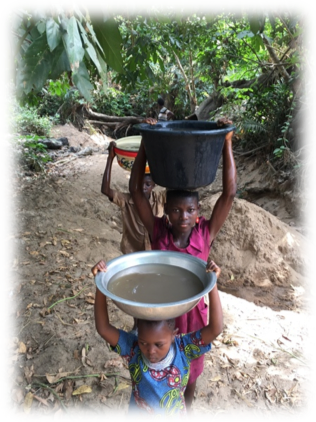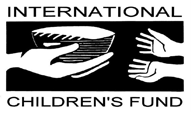The basic necessities for human life include air, water, food, and shelter. ICF has programs to support three of these basic necessities – food, shelter, and water. Today we are going to focus on water.
In the USA, we tend to take having access to clean drinking water for granted. We just turn on a faucet and fresh, clean water seems to magically appear. This however is not true for much of the world. Studies suggest that more than 2 billion people (representing nearly 1/3 of the global population) do not have safely managed drinking water and the problem is particularly prevalent in the rural villages in Africa where ICF focuses its efforts. Contaminated water can cause cholera, diarrhea, dysentery, hepatitis A, and typhoid. Children are particularly susceptible to these illnesses
The World Health Organization estimates that 115 people in Africa die per hour as a result of the lack of safe water – nearly half of which are under the age of 5.
In Africa, villagers often rely on surface water (streams, ponds, or even puddles) for water. These sources of water are also used for bathing, washing, and for livestock. As a result, the water is often contaminated and not suitable for drinking. However, the villagers collect this water and use it for cooking, washing, and yes – even drinking. Searching for and carrying water is commonly the responsibility of women and children (as shown in the photo below). Using every imaginable container, they carry water back to their homes and their families. Imagine spending a significant portion of your day just trying to fulfill this basic need – and to be forced to rely on a water source that is likely to cause illness.

God is not unjust; He will not forget your work and the love you have shown Him as you have helped His people and continue to help them.
– Hebrews 6:10
Now imagine the impact of a local water well. It is not as convenient as what we enjoy with in our homes, however, it is safe and readily available. A water well can service an entire village for years to come. It will not only save lives but will allow the villagers to use the time previously spent on the daily routine of finding and transporting water for a more productive task.

The little girl depicted above is holding two bottles of water, one is dirty and contaminated – from surface water and the other is clean and fresh – from the new well in her village provided by ICF. Drilling water wells makes a profound and sustainable impact on the villages where we work. This is consistent with ICF’s mission. ICF plans to support the drilling of more than a dozen water wells during 2020. We estimate that these wells will service the needs of more than 12,000 people.
Please help us to service this most basic need – to have access to fresh clean water.
Regular giving helps us support the drilling of water wells and also supports other programs promoting sustainable improvements in the lives of desperately poor children and their families throughout Africa and India. We call these donors Hope Ambassadors because they help ICF to provide hope to those who truly face life and death needs in Africa and India. If you would consider becoming a Hope Ambassador, please visit our website at www.icfaid.org or call our office at 920-729-5721.
Please know that every gift, no matter how large or small, is an answer to our prayers and an investment in the life of a child. From the bottom of my heart, I thank you for your continued prayers and financial support.

Please help us to service this most basic need – to have access to fresh clean water.
